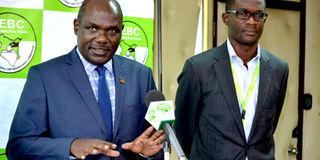Uncertainties cast dark cloud over upcoming repeat presidential poll

Independent Electoral and Boundaries Commission (IEBC) Chairman Wafula Chebukati (left) and CEO Ezra Chiloba at Anniversary Towers, Nairobi, on April 5, 2017. PHOTO | SALATON NJAU | NATION MEDIA GROUP
What you need to know:
The IEBC initially scheduled a fresh presidential election for October 17, but has since pushed the date to October 26.
According to the Constitution, in the instance of a successful petition, a fresh election should be held within 60 days of the Supreme Court ruling, which in this case would be October 31.
Some people may switch their vote, for example, due to perceptions about who has the moral high ground or is likely to win.
On August 8, some 15.6 million Kenyans – or 80 per cent of registered voters – turned out to vote in the country’s General Election. On August 11, the Independent Electoral and Boundaries Commission (IEBC) declared President Uhuru Kenyatta winner of the presidential race with 54 per cent of the vote, a decision that was later overturned by the Supreme Court in a 4:2 majority ruling.
The reasons for this landmark decision include the following: That by failing to transmit presidential results (or forms 34A) from polling stations; provide all forms 34A as a means to verify constituency level results (forms 34B); explain a large number of anomalies (including the lack of security features on some forms 34B); and comply with the court’s ruling to provide access to the commission’s server and access logs, the IEBC had failed to conduct the election in accordance with the Constitution and relevant laws.
The IEBC initially scheduled a fresh presidential election for October 17, but has since pushed the date to October 26. However, it is possible that the date will be moved again.
According to the Constitution, in the instance of a successful petition, a fresh election should be held within 60 days of the Supreme Court ruling, which in this case would be October 31.
CONSTITUTION
However, it may come to a point where it is argued, and broadly accepted, that more time is required to ensure that the election is conducted in accordance with the Constitution.
Whenever the election is held, the precedent set by the Supreme Court renders it likely that whoever loses will petition the results. This opens the door to the possibility of a third election.
As Chief Justice David Maraga noted: “This court, whenever called upon to adjudicate on a similar dispute, will reach the same decision if the anomalies remain the same, irrespective of who the aspirants may be”.
But what about the likely outcome if the election is free and fair? Significantly, while the four Supreme Court judges concluded that the August 8 election was neither transparent nor verifiable, they did not assess the accuracy of the outcome. The implication: We do not know what the exact result was.
Predicting the future is further complicated by the fact that voting patterns may change.
INTIMIDATION
First, some people may switch their vote, for example, due to perceptions about who has the moral high ground or is likely to win. Or because of more local level issues, such as the influence of politicians who have switched sides and possible intimidation in Jubilee and Nasa strongholds to vote in line with the local majority or to not vote at all.
This leads to a second, and likely more important factor, variations in turnout. On the one hand, in an increasingly polarised political environment, turnout may well increase in some Jubilee and Nasa strongholds. This is reflected in ongoing discussions among local activists about how to mobilise registered voters who are known to have stayed home on August 8.
On the other hand, turnout may decrease in other places. On August 8, Kenyans voted for six elected officials – President, Governor, Senator, Woman Representative, Member of Parliament and Member of County Assembly – who all conducted intense campaigns and sometimes facilitated voters to get to the polling centres.
IMPORTANT RACE
Moreover, while the majority of Kenyans view the presidency as the most important race, some are more interested in lower-level races – such as the MCA or governorship – and may feel less motivated to turn out. This is particularly true for those who do not feel particularly close to, or passionate about, either candidate.
The implication is that it is a mistake for people to assume that their preferred candidate will win. Ultimately, the results will depend on the credibility of the process, but also on evaluations of who is the best candidate and turnout, which will depend on the campaigns and the messages and motivations provided.
If voters have an opinion about who their next president should be it is therefore critical that they turn out to cast their vote.
Gabrielle Lynch is Professor of Comparative Politics, University of Warwick, UK ([email protected]; @GabrielleLynch6)





